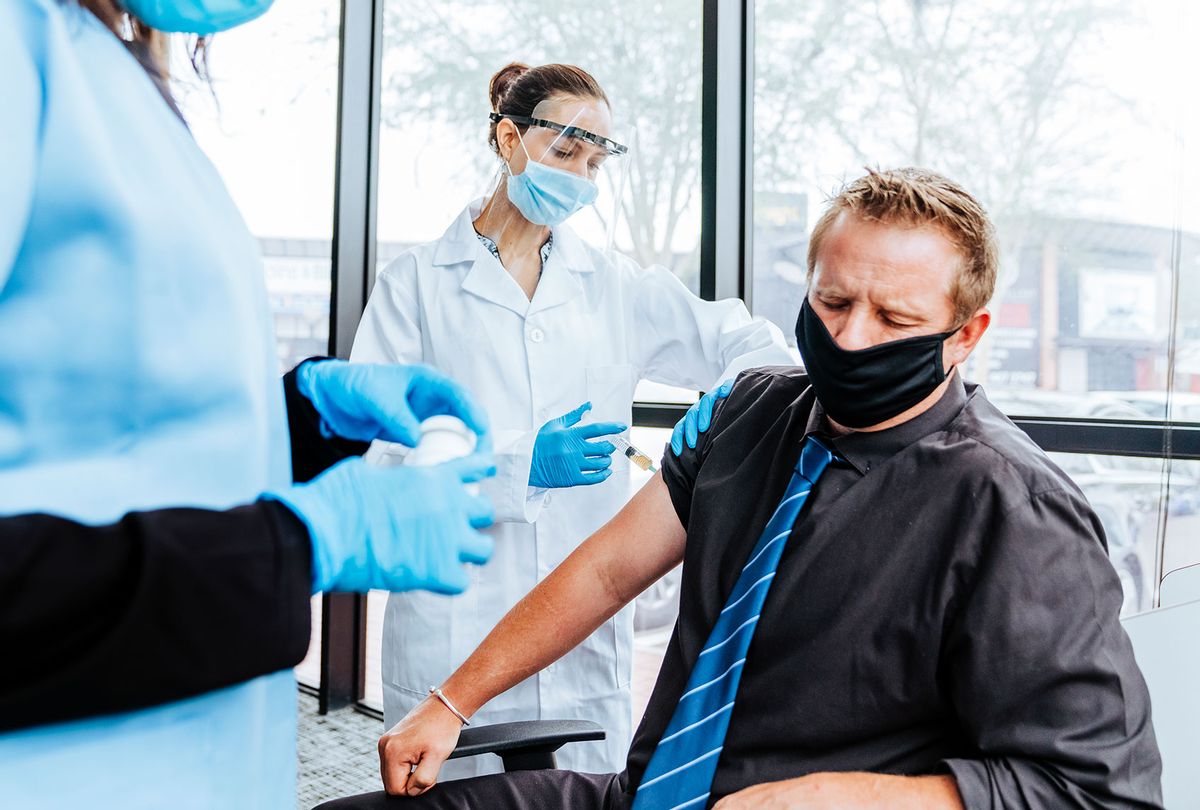Unsubstantiated rumors that the COVID-19 vaccine causes impotence have entered the public discourse because of comments made by rapper Nicki Minaj.
It started when Minaj recently tweeted that she would not be attending last week's Met Gala due to its vaccination requirement. "They want you to get vaccinated for the Met," she wrote in a since-deleted tweet. "If I get vaccinated it won't for the Met. It'll be once I feel I've done enough research. I'm working on that now."
Later, she suggested that the vaccine might be linked to male infertility, a suspicion that she said stemmed from a story she heard about her cousin's friend.
"My cousin in Trinidad won't get the vaccine cuz his friend got it & became impotent. His testicles became swollen," she wrote on Twitter. "His friend was weeks away from getting married, now the girl called off the wedding. So just pray on it & make sure you're comfortable with ur decision, not bullied."
Minaj's incredible reach — 22.8 million follow her on Twitter — combined with the anatomical peculiarity of the anecdote helped make her story about her cousin go viral, spawning memes, condemnations from public health officials, and even sparking a rebuttal from Trinidad and Tobago's Health Minister, who said there was no record of any such incident in the Caribbean nation.
As other health experts attested as well, there is no scientific evidence that the COVID-19 vaccine will negatively affect a male reproductive system. Yet contracting the virus itself can cause male reproductive health issues.
"I am not aware of any evidence that any of the COVID-19 vaccines cause male infertility, impotence, or swollen testicles," Allan Pacey, Professor of Andrology at the University of Sheffield, told Salon. "However, I am aware of published reports that catching COVID-19 can be associated with testicular pain, an increased frequency of erectile dysfunction, and a temporary reduction in sperm production."
Channa Jayasena, a Clinical Senior Lecturer and Consultant in Reproductive Endocrinology and Andrology at Imperial College, concurred.
"There is no evidence that the COVID-19 vaccine causes impotence or testicle swelling in men," Jayasena said. "However, a recent study suggests that mild COVID-19 infection (not the vaccine) may slightly reduce your sperm count and quality."
Want more health and science stories in your inbox? Subscribe to Salon's weekly newsletter The Vulgar Scientist.
Indeed, this message has been confirmed by the Centers for Disease Control and Prevention (CDC), the Society for Male Reproduction and Urology (SMRU), the Society for the Study of Male Reproduction (SSMR) and many more medical experts.
There have been studies specifically related to COVID-19 vaccines and fertility. Ranjith Ramasamy, Director of Reproductive Urology at the University of Miami, co-authored a study looking at sperm count in 45 men between the ages of 18 and 50 years old.
"In this study, no significant changes in sperm parameters were seen following COVID-19 mRNA vaccination of males at 3- and 6-month follow-up," Ramasamy told Salon. "Thus far, vaccines have been proven to be safe and effective in combating COVID-19 with no evidence indicating they can negatively impact the sexual health of males or females."
Despite this, Minaj's comments reflect an ongoing false narrative in anti-vaccine and alternative health groups: that vaccines cause infertility in both women and men. Similar to unsubstantiated fear around how the COVID-19 vaccines might harm a woman's reproductive system, male infertility is often used as a way to cause fear around getting vaccinated.
But why are the two — vaccines and fertility — often linked in anti-vaccine propaganda?
Experts speculate that it is, in part, because fears of infertility play on common, deep human fears. In some cases, a lack of research around a topic can create a breeding ground for misinformation. And other times, myths stem from a misinterpretation of a study.
Unlike some previous instances of scientific misinformation having its origin in retracted studies, it is unclear exactly where myths about the COVID-19 vaccines harming the male reproductive system originated from. Aside from Minaj's remarks, it is possible that scientific evidence around fevers causing a temporary decline in sperm count have been manipulated.
As the Society for Male Reproduction and Urology (SMRU) and the Society for the Study of Male Reproduction (SSMR) explained in a joint statement: "It should be noted that about 16% of men in the Pfizer/BioNtech COVID-19 vaccine clinical trial experienced fever after the second dose. Fevers can cause temporary declines in sperm production."
Therefore, if a man experiences fever as the result of the COVID-19 vaccine, the joint statement said, that man may experience a temporary decline in sperm production.
"But that would be similar to or less than if the individual experienced fever from developing COVID-19 or for other reasons," the statement explained.
Conversely, there is scientific evidence that suggests getting infected with COVID-19 can affect male fertility, as multiple researchers described. Ramasamy worked on a separate study where he and his colleagues analyzed the autopsy tissues of the testicles of six men who died of COVID-19 infection. They found that in three of the men, there was a decreased number of sperm. The same study showed that a COVID-19 infection could lead to severe erectile dysfunction. The researchers speculated it could be because the infection causes reduced blood supply to the penis.
As Ramasamy previously wrote: "These findings are not entirely surprising. After all, scientists know other viruses invade the testicles and affect sperm production and fertility."
Any women or men who are concerned about their reproductive health and COVID-19 should get vaccinated, experts advise.
"I would urge all men (and women) to get vaccinated when they get the opportunity," said Pacey.



Shares